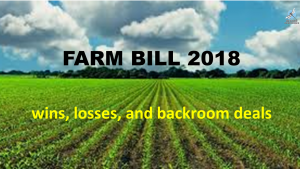19
Dec
Analysis: Wins and Losses in the Farm Bill—Time for a Green New Deal
 (Beyond Pesticides, December 19, 2018) As the dust still settles on the final Farm Bill, which passed the U.S. Senate and House of Representatives last week, it is clear that neither the substance nor the process on a range of issues meet the urgent need to address key sustainability issues that put the future in peril.
(Beyond Pesticides, December 19, 2018) As the dust still settles on the final Farm Bill, which passed the U.S. Senate and House of Representatives last week, it is clear that neither the substance nor the process on a range of issues meet the urgent need to address key sustainability issues that put the future in peril.
We must not allow this Farm Bill to be the final word on a number of critical environmental and public health issues facing the nation and world. That is why it is absolutely critical that we get to work immediately, with the new Congress, to set a new course that transforms the institutions of government that are holding back the urgently needed transition to a green economy.
On the Farm Bill, our victories were mostly measured in terms of what we were able to remove from the legislation—not the standard of achievement that we need to face critical environmental threats.
The good. Our major victory in the Farm Bill does not move us forward, but simply protects the status quo of our democracy—protecting the power of states and local government to adopt pesticide restrictions that are more stringent than the federal government. With your help and the help of a broad network of local officials nationwide, we were able to stop a preemption provision from being inserted in the federal pesticide law. Although the victory was in defeating this provision, the chemical industry has awakened a new front in the pesticide reform movement. As a result of this provision, there is new momentum to reassert the rights of local governments and repeal state-level preemption of municipalities. Other environmental setbacks to the Endangered Species Act, Clean Water Act, and farmworker protection were taken out of the final bill. A great thanks to those who participated in this important process.
The bad. We were unable to remove an amendment to organic law that introduces confusion on the mandate to sunset all synthetics used in organic agricultural production and processing, forcing the National Organic Standards Board (NOSB) and USDA to reassess the science and necessity of these inputs with the most rigorous scrutiny by requiring a super-majority vote of the board every five years to allow continued use of these synthetics—the same standard used when synthetics are initially petitioned. The growth of organic is essential to solving our key environmental challenges, from the dramatic decline in biodiversity to global climate change. Nothing should be done to undercut the integrity of the organic standard setting process. Additionally, new language in the organic law allows farmer, handler, and retailer positions on the NOSB to be filled by employees of farmers, handlers, and retailers, making the decision making process less robust.
The ugly. The Farm Bill sets policy on food and farm issues for the next five years and should not be the result of backroom negotiations in Congress, as it was this round. Important and controversial issues deserve public hearings in which all members of Congress and the public can participate, and all perspectives can be heard.
More on organic. There were some “wins” for organic in continued funding for programs important to organic production and research, and necessary improvements to oversight and enforcement of organic imports.
New leadership. Increasing support is being shown for a proposal by U.S. Representative-Elect Alexandria Ocasio-Cortez of New York to form a House Select Committee for a Green New Deal that addresses economic and environmental reforms while ensuring a functioning democracy. A Green New Deal provides a framework for supporting agriculture that helps farmers, consumers, and the environment by advancing organic agriculture. In the words of commentator and former Texas Agriculture Commissioner Jim Hightower, “Everybody does better when everybody does better.” We need new food and farm policy that benefits all farmers and consumers.
After the new 116th Congress begins on January 3, 2019, you will be hearing from Beyond Pesticides on a range of critical issues that have gotten unsatisfactory attention in the Farm Bill and other legislation and regulations.










